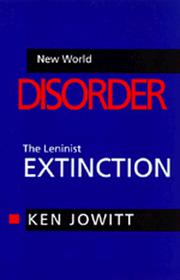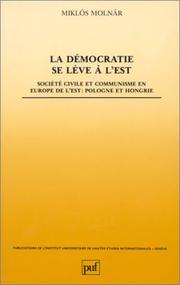| Listing 1 - 2 of 2 |
Sort by
|

ISBN: 0520913787 0585043760 9780520913783 9780585043760 0520077628 9780520077621 0520082729 9780520082724 Year: 1993 Publisher: Berkeley, California : University of California Press,
Abstract | Keywords | Export | Availability | Bookmark
 Loading...
Loading...Choose an application
- Reference Manager
- EndNote
- RefWorks (Direct export to RefWorks)
Communism, or as Ken Jowitt prefers, Leninism, has attracted, repelled, mystified, and terrified millions for nearly a century. In his brilliant, timely, and controversial study, New World Disorder, Jowitt identifies and interprets the extraordinary character of Leninist regimes, their political corruption, extinction, and highly unsettling legacy. Earlier attempts to grasp the essence of Leninism have treated the Soviet experience as either a variant of or alien to Western history, an approach that robs Leninism of much of its intriguing novelty. Jowitt instead takes a "polytheist" approach, Weberian in tenor and terms, comparing the Leninist to the liberal experience in the West, rather than assimilating it or alienating it. Approaching the Leninist phenomenon in these terms and spirit emphasizes how powerful the imperatives set by the West for the rest of the world are as sources of emulation, assimilation, rejection, and adaptation; how unyielding premodern forms of identification, organization, and action are; how novel, powerful, and dangerous charisma as a mode of organized indentity and action can be. The progression from essay to essay is lucid and coherent. The first six essays reject the fundamental assumptions about social change that inform the work of modernization theorists. Written between 1974 and 1990, they are, we know now, startingly prescient. The last three essays, written in early 1991, are the most controversial: they will be called alarmist, pessimistic, apocalyptic. They challenge the complacent, optimistic, and self-serving belief that the world is being decisively shaped in the image of the West--that the end of history is at hand.
Communist state. --- Political culture --- Communism. --- Communist state --- Communism --- Political Theory of the State --- Political Science --- Law, Politics & Government --- Bolshevism --- Communist movements --- Leninism --- Maoism --- Marxism --- Trotskyism --- Collectivism --- Totalitarianism --- Post-communism --- Socialism --- Village communities --- Culture --- Political science --- State, Communist --- State, The --- Dictatorship of the proletariat --- People's democracies --- 316.323.72 --- 321.74 --- 321.74 Arbeidersraden. Communisme. Dictatuur van het proletariaat. Sovjets volksdemokratie --- Arbeidersraden. Communisme. Dictatuur van het proletariaat. Sovjets volksdemokratie --- 316.323.72 Socialistische maatschappijvormen --- Socialistische maatschappijvormen --- Communist countries --- 1945 --- -Communist state --- adaptation. --- assimilation. --- bolshevik. --- communism. --- communist government. --- controversial. --- emulation. --- extinction. --- gorbachev. --- government and governing. --- inclusion. --- lenin. --- leninism. --- leninist regimes. --- menshevik. --- modernization. --- moscow centre. --- neotraditionalism. --- political charisma. --- political corruption. --- political culture. --- political ideology. --- political legacy. --- politics. --- polytheist approach. --- rejection. --- russia. --- russian history. --- russian politics. --- social change. --- soviet government. --- soviet history. --- soviet politics. --- soviet union. --- soviet.

ISBN: 2130431941 2940549338 9782130431947 Year: 1990 Publisher: Paris: PUF,
Abstract | Keywords | Export | Availability | Bookmark
 Loading...
Loading...Choose an application
- Reference Manager
- EndNote
- RefWorks (Direct export to RefWorks)
L'histoire au présent, un livre qui analyse l'Europe communiste jusqu'à la fin 1989. La réalité dépasse toutes les prévisions : l’Europe communiste est en pleine décomposition et des démocraties émergent après quarante ans de régime totalitaire. Le communisme s’interroge sur son passé et l’Europe sur son avenir. Devant ces énormes bouleversements, le livre de Miklós Molnár – professeur émérite de l’Institut Universitaire de Hautes Études Internationales, auteur de nombreux ouvrages sur le phénomène communiste en Europe centrale – nous apporte une première réponse approfondie. À ce moment, la perestroïka – encore incertaine en URSS – se réalise dans plusieurs satellites de Moscou. Par le biais de la Pologne et de la Hongrie, l’auteur examine ce long processus d’évolution, semé d’embûches et d’échecs, qui a conduit à la désintégration de leur système communiste. Simultanément, on constate une difficile mutation économique. L’analyse de ces changements est menée jusqu’à la fin de 1989. En outre, l’auteur remonte aux origines historiques et culturelles de la crise du communisme. Il confronte les fondements idéologiques du système aux racines culturelles des pays en question et montre les conséquences sociologiques entraînées par la stalinisation. L’ouvrage consacre une place importante à la société civile qui a trouvé refuge dans les valeurs spirituelles, et qui, loin d’avoir été stérilisée, a provoqué ce mouvement de liberté et de renouveau. Elle permet aujourd’hui à la démocratie de renaître dans les pays les plus avancés de l’Europe de l’Est.
Communism and society --- Democracy --- Communisme et société --- Démocratie --- Europe, Eastern --- Hungary --- Poland --- Pologne --- Autonomy and independence movements --- Communism --- Autonomy and independence movements. --- Communism. --- Communisme --- 321.74 <4-11> --- Politics and government --- Social conditions. --- Social conditions --- Communism - Europe, Eastern --- Europe, Eastern - Politics and government - 20th century --- Europe, Eastern - Social conditions --- Etat | nation --- démocratie --- nationalisme --- géopolitique --- EUROPE CENTRALE --- POLOGNE --- HISTOIRE --- HONGRIE --- HISTOIRE CONSTITUTIONNELLE --- 20E SIECLE
| Listing 1 - 2 of 2 |
Sort by
|

 Search
Search Feedback
Feedback About UniCat
About UniCat  Help
Help News
News